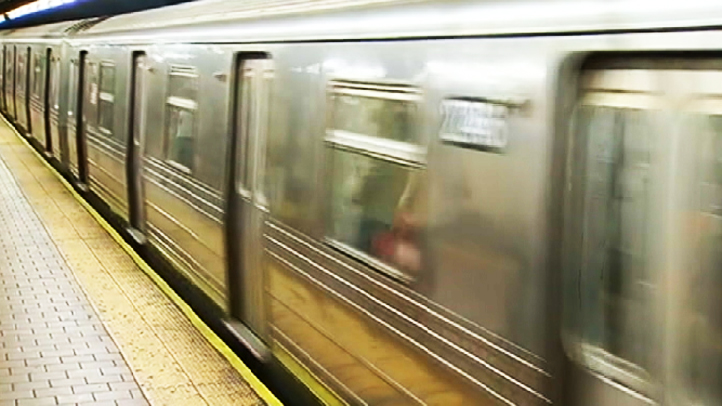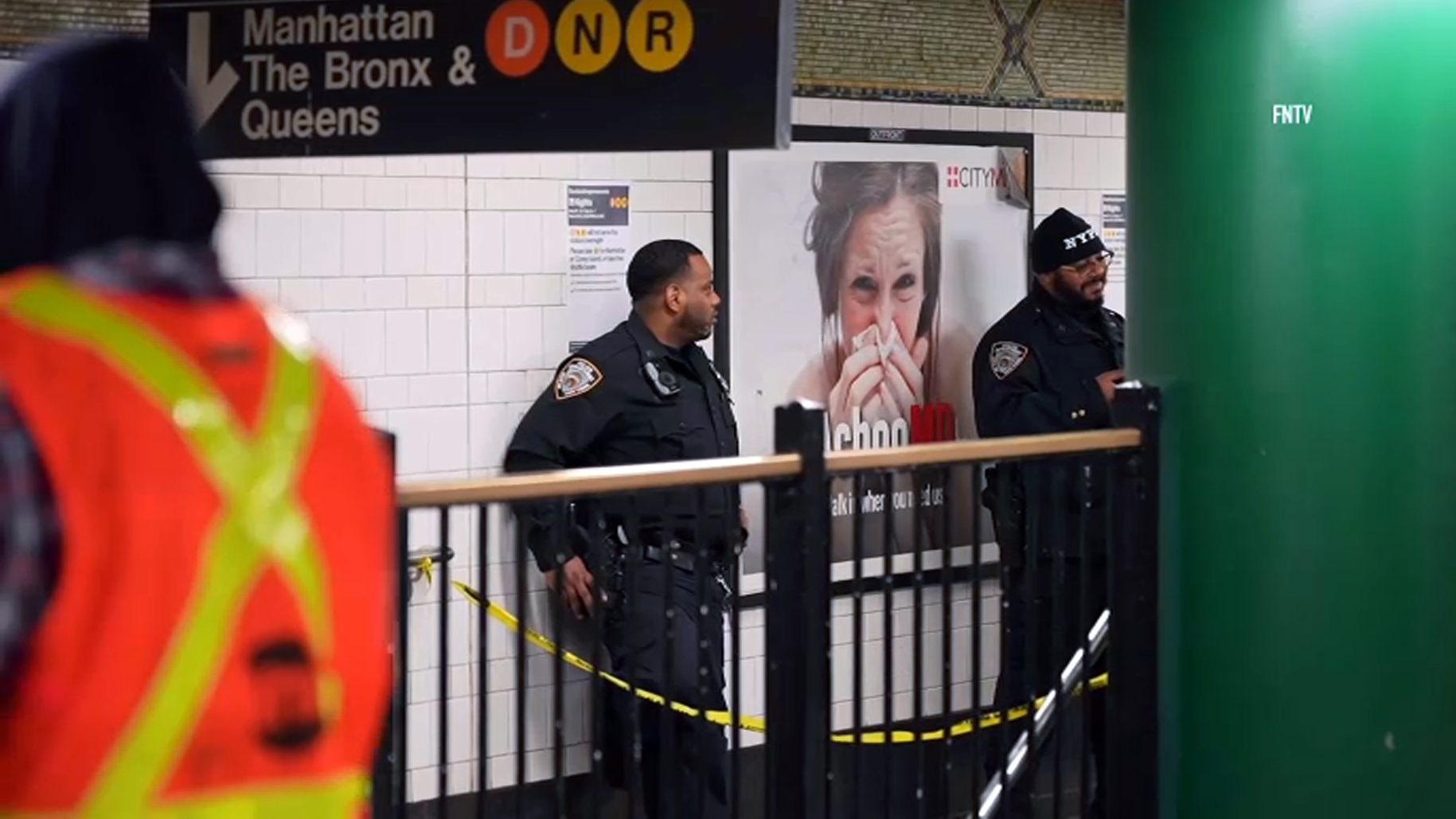What to Know
- The death of a homeless man who allegedly threatened passengers aboard a New York City subway and was later put into a chokehold by one of the riders has been deemed a homicide -- fueling even louder calls for criminal charges in the case.
- Investigators had said they were waiting on the report to determine whether or not it was the chokehold that killed 30-year-old Jordan Neely at the Broadway-Lafayette station Monday afternoon. However, no charges have yet been filed against the 24-year-old passenger who put Neely in a headlock.
- Some are now calling for justice for Neely, who was homeless and struggled with mental illness, and for the person who was initially hailed as a Good Samaritan to be arrested. Protests are being scheduled across the city for Thursday and Friday.
The death of a homeless man who allegedly threatened passengers aboard a New York City subway and was later put into a chokehold by one of the riders has been deemed a homicide -- fueling even louder calls for criminal charges in the case.
Investigators had said they were waiting on the report to determine whether or not it was the chokehold that killed 30-year-old Jordan Neely at the Broadway-Lafayette station Monday afternoon. However, no charges have yet been filed against the 24-year-old passenger who put Neely in a headlock.
Some are now calling for justice for Neely, who was homeless and struggled with mental illness, and for the person who was initially hailed as a Good Samaritan to be arrested. A GoFundMe established by an aunt to pay funeral expenses raised thousands of dollars in a matter of minutes Thursday afternoon.
Get Tri-state area news delivered to your inbox. Sign up for NBC New York's News Headlines newsletter.
Multiple protests were held Thursday and more are planned across the city on Friday, and Gov. Kathy Hochul said Thursday she was glad the district attorney was investigating the case, as a senior prosecutor was said to be looking into the matter.
"I'm really pleased that the district attorney is looking into this matter," Hochul said in remarks at an unrelated event. "As I said, there have to be consequences, and so we'll see how this unfolds - but his family deserves justice."
Hochul said the chokehold was a "very extreme response" to an outburst by Neely that she said was not violent.
Other officials equally called on the DA's office to do something — and quickly.
"The initial response by our legal system to this killing is disturbing and puts on display for the world the double standards that Black people and other people of color continue to face. There must be accountability for his killing, and a thorough investigation by the Manhattan district attorney that accounts for the facts and these realities is critical," NY City Council Speaker Adrienne Adams said in a statement.
Late Thursday, attorneys for Neely's family said in a statement that "passengers are not supposed to die on the floor of our subways." The statement went on to say that "there has to be a clear line of when lethal force can be used by anyone, including civilians," and referenced other recent examples of people shot for being in the wrong place at the wrong time.
"We have people being killed for ringing the wrong doorbell, pulling in the wrong driveway and screaming out for desperation on the subway," the attorney said. "We cannot let that stand."
The NYPD tweeted a statement Thursday asking for the public's assistance in the ongoing investigation.
"We need your help in regard to an incident that occurred on Monday, May 1, 2023, at the Broadway-Lafayette Street subway station. Anyone with information, photographs, or video is asked to please contact @NYPDTips or call 1(800)577-TIPS," the NYPD's tweet said.
Jordan Neely Death Timeline
The NYPD said it was called to the NoHo station around 2:25 p.m. Monday after a report of a physical fight in a northbound F train.
Witnesses and law enforcement sources said Neely got on the train and started acting very aggressively toward other riders, threatening to harm them. Police sources told NBC New York that Neely told riders on the train that he wanted food, that he wasn't taking no for an answer, and that he would hurt anyone on the train.
"The man got on the subway car and began to say a somewhat aggressive speech, saying he was hungry, he was thirsty, that he didn't care about anything, he didn't care about going to jail, he didn't care that he gets a big life sentence," said Juan Alberto Vazquez, who was in the subway car and recording part of what happened afterward. "That 'It doesn't even matter if I died.'"
Vazquez said he was scared, and believes others on the train were as well. It was then that a 24-year-old rider came up behind Neely and put him in a chokehold, holding him on the ground. Two other men stood over them and also helped subdue him, video showed.
"If there was fear, the people who...were there where he separated everything, moved from their place. I stayed sitting in my place because it was a little further away, but obviously in those moments, well, one feels fear. One thinks he may be armed," Vazquez said.
He said that the chokehold lasted about 15 minutes as they waited for police to respond, and it was held even as the train stopped at the subway station and the doors opened. That's when Vazquez said most of the people who were inside the train car left, with a few exceptions, including the three who had been working to subdue Neely.
It was not clear why passengers had moved to restrain Neely. One witness, Vazquez who was on the train and recorded Neely becoming unconscious as he was restrained, said that while Neely was acting aggressively and threw his jacket, he hadn’t attacked anyone.
Neely was unconscious on the car floor when officers arrived, and died at the scene.
Vazquez said no one thought the man would die, even after he went limp.
"I think no one thought he was in a risky situation because he was defending himself all the time, all the time he moved, he tried to remove his arm," said Vazquez. "Then when they had it on his side, he kept kicking, so we thought that's him defending himself."
One person in the video of the incident can be heard questioning whether Neely had been fatally injured, pointing out that defecation is a sign that he had died. Vazquez said he was conflicted over whether he thought the rider who subdued Neely went too far.
"It's difficult, it's a very big dilemma. And after two days, I still think it's complicated. It's difficult to judge," said Vazquez.
In the absence of video showing what might have precipitated the attack, many were reserving judgment. During an appearance on CNN on Tuesday night, Mayor Eric Adams, a former police captain, said there were still too many unknowns.
“We don’t know exactly what happened here,” Adams said, adding that “we cannot just blatantly say what a passenger should or should not do in a situation like that, and we should allow the investigation to take its course.”
He echoed those sentiments on Thursday, saying that he has "a responsibility for this entire city and I have faith in the criminal justice system, and I'm going to let the process take its place."
The mayor has said that the incident underscores what he says is a need to remove people with mental illness from the transit system — a push he began with Gov. Hochul in the early days of his administration. The governor's office said that Safe Option Support (SOS) teams in the subway have conducted more than 6,800 outreach encounters and have enrolled 838 individuals into interventions services.
Calls for Jordan Neely Charges
The medical examiner’s office ruled Wednesday night that Neely died in a homicide caused by compression of the neck, but the office said that any determination about criminal culpability would be left to the legal system.
Regardless, many New Yorkers saw the choking as the latest in a long history of attacks on Black city residents.
“We’re like animals in white people’s backyards. They want to get rid of us,” said Diango Cici, a 53-year-old Manhattan resident.
Protests have sprung up outside the Manhattan DA's office and throughout the city, including in front of Barclays Center, where a large group demonstrated Thursday night.
"After we saw that tape, (and) that the medical examiner clearly ruled that it was in fact a homicide, so we now have clear-cut evidence Mr. Neely died of that chokehold. (The other man) should be prosecuted," said co-founder of Black Lives Matter of Greater New York Chivona Newsome.
The 24-year-old who delivered the chokehold was questioned and later released, the NYPD said. He has not yet been charged, and it was not clear if he would face charges.
Mayor Adams did not initially weigh in on the matter, as a spokesperson said that "any loss of life is tragic. There's a lot we don't know about what happened here," adding that they were aware there were "serious mental health issues in play here."
"The way detectives have to look at this case is, what would a reasonable person do and what would a reasonable person be expected to do," said former NYPD Chief of Department Terry Monahan.
NBC New York has reached out to the 24-year-old multiple times, but he has declined to comment. Several reports stated that he is a former Marine — which a former NYC prosecutor said could hurt a self-defense claim.
"If he knew and was trained to use a chokehold, he would be no different than the training a police officer would get," said former Manhattan prosecutor Michael Bachner. "The argument is going to be that he acted in a way that he should have known could result in death."
Marine recruits are routinely taught about executing and defending against chokeholds, which can render someone unconscious in as few as eight seconds, according to a military manual revised in 2020.
The lethal risks of chokeholds led New York City to ban police officers from using them. An officer was fired for using a chokehold on Eric Garner, a Black New Yorker whose dying words “I can’t breathe” became a chant in protests against racial injustice.
A U.S. Department of Justice website called chokeholds “inherently dangerous” and said that they have “too often led to tragedy.”
Law enforcement sources with knowledge of the case said Neely had a lengthy criminal history, with charges including assault and disorderly conduct. But those who knew of him said Neely was a well-known Michael Jackson impersonator. Manhattan Borough President Mark Levine noted he had seen Neely perform many times, and always made people smile.
Neely, who in the past had earned money imitating Michael Jackson, died Monday after an early-afternoon confrontation aboard a train beneath Manhattan. Neely, who had been homeless at points, according to people who knew him, had been shouting at fellow passengers when another rider wrapped his arm around his neck and pinned him on the floor. Two other passengers also helped restrain Neely.
No one has been arrested but the Manhattan district attorney’s office said a senior prosecutor is investigating the case, looking to review autopsy reports as well as “assess all available video and photo footage, identify and interview as many witnesses as possible, and obtain additional medical records.”
Police questioned the man who the video showed holding Neely in a headlock for at least 3 minutes — perhaps longer — but released him without charges. His name was not released by police, but his relationship with the Marines was disclosed by a law enforcement official who wasn’t authorized to make the information public and spoke on condition of anonymity because the investigation was not yet complete.
Street performers who knew him described Neely as a kind and gifted impressionist, who sank into a depression as a result of his mother’s death. According to news accounts at the time, Christie Neely was strangled in 2007. Neely, who was 14 when she died, testified against his mother’s boyfriend at his murder trial.
Tari Tudesco, a back-up dancer in the Michael Jackson tribute act “Michael’s Mirror,” said many in the community had grown worried about Neely’s absence in recent years, and had begun searching for him, unsuccessfully.
“We were in shock to find now that he was living homeless,” she said. “We feel terrible.”
The Rev. Al Sharpton demanded in a statement that Neely’s death be investigated as a potential case of manslaughter. Sharpton referenced the Bernhard Goetz case in 1984, in which a white gunman was convicted of a weapons offense after he shot four Black men on a subway train.
“We cannot end up back to a place where vigilantism is tolerable. It wasn’t acceptable then and it cannot be acceptable now,” Sharpton said.




